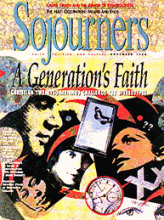Oliver North stands in front of the Dahlgren Fire House in King George, Virginia, and exhorts the small gathering of supporters. Behind him is the open firehouse door and a row of volunteer firefighters, hands on hips or arms crossed at their chests, listening intently.
The earnest, gap-toothed face is a familiar one. So is the litany of conservative themes emerging from it: balanced-budget amendment, line-item veto, term limits.
But the ex-Marine colonel throws his own unique twist into his speech. Politics, he says, is a lot like combat: You need good troops and lots of ammunition. And to win his race for the U.S. Senate, North insists that he needs the prayers of his supporters—"I’m living proof of the power of prayer." He concludes his stump speech, "God bless you all; Semper Fi."
God and country. Praise the Lord and keep the ammunition flowing. Familiar themes, and popular ones in these parts. Throughout the South, 60 percent of voters tell pollsters that they are born again. Christians clearly have the power to swing elections, and North’s supporters are expecting the swing to be a decisive one.
Read the Full Article

